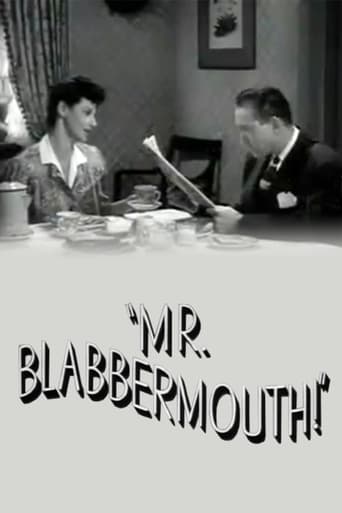SimonJack
"Mr. Blabbermouth" is a well-crafted propaganda film that uses humor with common sense. It presents solid facts to inform the public about World War II in the Pacific theater. It is MGM's answer to grumbling and defeatism. Rumors and gossip spread among the public after the Japanese attack on Pearl Harbor (Dec. 7, 1941). Unlike some propaganda films, this one avoids any negative implications about the Japanese race or culture. Instead, it tackles head-on claims about Japanese military forces, war production and resources. Those had been widely exaggerated in the rumor mill of the day. This short came with a DVD of "Mrs. Miniver." I found the data it provides very interesting. There had been gossip about Japan's superior war strength, but this 19-minute short showed the data. It gives the numbers for naval strength by Japan and the Allies that had forces in the Pacific. Those included the U.S., Great Britain and the Netherlands. There's no plot to give away in this review, so others may be interested in this data.Japan had 11 battle ships and the Allies had 16 in the Pacific. Japan had nine carrier and the Allies had 7, but the Allied carriers had 100 more planes on their larger ships. Japan had 49 cruisers to 61 for the Allies, 130 destroyers to 163 for the Allies, and 75 submarines to 90 for the Allies. In wartime production, the data just compared Japan with the U.S. Japan was producing 7 million tons of steel yearly, and the U.S. was producing more than 12 times as much - 88 million tons. Japan was producing 24,000 tons of aluminum per year, compared to 400,000 tons yearly in the U.S. And, Japan produced 85,000 tons of copper annually while the U.S. produced 800,000 tons. Comparing the Axis and Allies on energy supplies is as equally lopsided. The Axis countries then (Germany, Japan, Italy, Bulgaria, Hungary, Romania, and Slovakia) controlled 29 percent of the world's coal, while the Allies (Great Britain, the U.S., the Soviet Union, China, and Canada with other nations aligned) controlled 67 percent. And the Axis powers held a mere three percent of the world's oil resources, compared to 97 percent by the Allies. This type of propaganda was hard to beat. It did much to dispel efforts, intended or not, to demoralize and frighten the American public. And, it alerted the public to be wary of people who spout off as experts when they couldn't possibly know more than their listeners.
MartinHafer
This is an amazingly well made propaganda film--one that is backed up with facts and isn't about stirring up the people. In fact, unlike most propaganda, its aim is to CALM the public--to get them to understand the facts and NOT give way to crazy rumors. In essence, this short film demonstrates that propaganda CAN be good, as propaganda consists of an argument meant to sway opinion--and isn't always bad. In particular, the industrial output of the Allied nations is compared to the Axis--showing that victory is all but inevitable (which turned out to be true)."Mr. Blabbermouth" is also effective because in addition to using a lot of facts, it also employs a nice sense of humor when addressing the nay-sayers and people who spread wild rumors. You can't help but laugh AND be a bit inspired and relieved when you see the film.All in all, at the time this came out, there couldn't have been a much better tonic for frightened Americans. Folks WERE falling prey to insane rumors and they needed to relax and understand that the war was winnable--just not immediately. And, to understand the need to keep your head and confront rumor-mongers for the good of the nation. A wonderful little piece of history that seemed very well reasoned and constructed throughout. Well worth seeing.
arel_1
Wartime or peacetime, the basic idea of this film still applies: "for safety's sake, please engage brain before putting mouth in gear"; and don't assume that the guy you're listening to has followed that rule!As Ray Bolger observed in "The Wizard of Oz" back in 1939, "Some people without brains do an awful lot of talking!" And while such people usually only damage themselves by looking ridiculous in front of people who actually do know something about the subject under discussion, sometimes they do manage to do major damage to others, whether by innocently ruining a reputation over something they've misinterpreted or by "only trying to help!" (case in point on that last: the Mr. Blabbermouth who invited himself along on a camping trip some friends and I had planned--he nearly laced our trail stew with "perfectly harmless wild mushrooms" which my friend D correctly identified as death angel mushrooms and intercepted in the nick of time!)War or no war, Mr. Blabbermouth lives and can be hazardous to your health!
elyrest
At first glance this seems to be a stereotypical patriotic U.S. WWII film. It is much more than that even when you factor in some of the cringing portrayals of the enemy. If the enemy were as idiotic as they are often portrayed why were they such a problem? This film balances the jingoistic part with a very good message about attitude. Mr. and Mrs. Blabbermouth are the people who always make the worst of a good situation. If there is any good to be found they will bury it. This film tries to give the American public a feel good boost about their situation in the war. It's a morale builder and it works. I know that I would have felt more optimistic after seeing this short in 1942.


